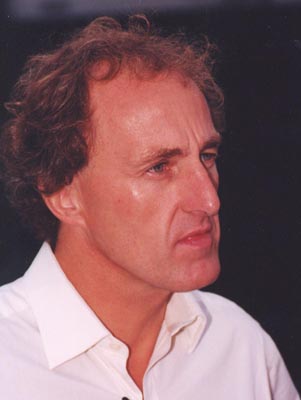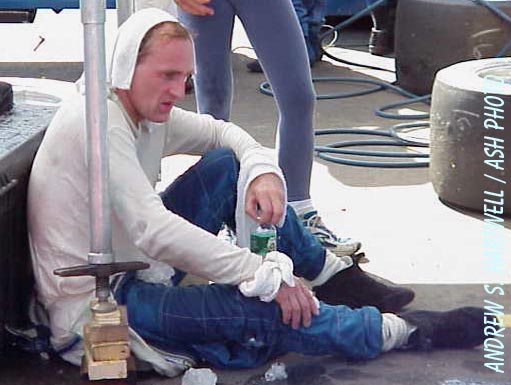Talking With James Weaver
© Andrew S. Hartwell
James Weaver's resume includes many significant achievements, including the 1998 Can-Am Championship in America - driving the Dyson Racing Riley & Scott MK3 - and the 1996 European GT1 Championship (BPR Global Endurance) - driving a GULF / McLaren GTR. No stranger to the victory podium, he has enjoyed tremendous success in sports car racing at race circuits around the globe. James got his first IMSA victory (at Road Atlanta) in 1987, driving a Porsche 962 for Bob Akin. In 1988, he ran for Rob Dyson, co-driving with Price Cobb and winning at Miami and San Antonio. He finished 4th in the driver's championship that year. He later gave Indy Car racing a shot (with Dyson) but soon returned to sports car racing, driving for BMW in the British Touring Car Series and winning 11 of 13 races!
In 1994, IMSA (the International Motor Sports Association now Professional Sports Car) introduced the World Sports Car series. Quick to be at the front, James picked up the first of what would become 17 World Sports Car / Can-Am victories, with a win at Sebring.
The early years at Dyson included coming into the World Sports Car races running a Spice chassis and Ferrari motor. "That engine was gorgeous", James told me. But the chassis was one that Pat Smith called 'junk". I asked him if it was true that Riley & Scott got involved with sportscar racing because of Rob Dyson. "Riley & Scott had a car on the drawing board but no one would commit to it. So Rob wrote a check and we got the first two chassis." And that initial purchase has proven to be one prudent investment, with James picking up 35 podium finishes with the Dyson team since 1994! (See Pat Smith interview for his comments on how many miles they have put on those cars!)
James is 44 years old. He makes his home in Wiltshire, England with his wife, Sylvie and their daughters Camilla and Jemima
Our Conversation
We had our conversation inside the media trailer at Lime Rock Park. There was a very loud Trans-Am car parked right outside the window. Wouldn't you know the car fired up several times during our talk? I love racecars but
"I've just come back from Paul Richard (race circuit in France) were we had a very good test (with the Audi R8C which James will drive at Le Mans)." James told me. "The car is well on the pace in race trim. We tested a few days and we didn't have any problems. But Le Mans is Le Mans. I hope we will run competitively, in the top ten, but I will be very surprised if Audi doesn't get at least one of their cars on the podium." This is being written one week prior to Le Mans. One thing is certain; any car with James Weaver at the wheel is instantly more competitive.
Do you have an opinion, one way or the other, on the differing views taken by the USRRC and American Le Mans Series? "Everyone's got an opinion. The sad thing about all this is that sports car racing is driven by (what happens at) Le Mans. Everybody thinks that Le Mans is the answer, unfortunately, historically, that has been the problem, for a number of reasons.
"One, the FIA and Le Mans have always been at loggerheads. For example, you may remember the FIA bringing in a rule about the length of the straight and chicanes so that you can't bring Le Mans in line with the FIA. They limited the length of the pit lane at any racetrack so Le Mans can't start enough cars. Because Le Mans has their own rules, and not FIA international rules, that's a big problem. In the European Sports Car Championship, all the cars wouldn't be guaranteed an entry there (in the 24 hours race).
"The final nail in the coffin is that, instead of running clearly defined classes, Le Mans insists on trying to make equality between GT and LMP. And of course, what is equality during a 24-hour race is not going to be equality in a two-hour race at Lime Rock or a six-hour race around Watkins Glen. Le Mans is also totally geared towards the manufacturers, the cost implications are horrendous, and they don't announce the rules until October, when the American season begins in January with Daytona. Really, what they are doing over in Le Mans, I think, bears no relationship to what the American sports car market needs.
"At Daytona, they will start 85 cars. Just turn up with a half decent car and you stand a good chance to get in the race. At Le Mans, show up with a very good car and you still may not get in. They have pre-qualifying, which is six or seven weeks before the race. You don't know if you are (going to be) in the race so you can't do your PR, (book your) hotels, and so on. The circuit can't promote the names or the cars because they don't know (who will be in the race). There are a host or problems with (the way they run the event).
"Now turn it around the other way. In America, there is so much motorsports that there is a place for everybody. For example, if you have a lot of money you can run CART or NASCAR. If you haven't got quite that much money, you can run IRL. Nobody, no individual or small team, is going to spend a fortune racing sports cars. You can't justify it. The gate won't stand it; the sponsors won't stand it and the TV package won't support it. For the American Le Mans series to work, it will have to depend on the manufacturers. And that TV package(James paused for a moment) unfortunately, sports car racing makes for very poor live TV. Le Mans for example is a wonderful event but it's actually a very poor race. If you ever watch it, you very rarely see a race going on. They don't even call it a race. It is the 24 hours of endurance. I personally don't think televising a sports car race live does the sport any favors. It needs to be packaged and presented properly. I think it is a fabulous sport and completely different to stock cars or CART, and you need a different approach to it. And also the cost stipulation, and the fact that you need a new car every year, is just ruinous. No one can afford it."
Should the factories be involved at all? "The Factories need to be involved but they need to be contained. They spend themselves broke. When Mercedes goes motor racing they do itif you are racing at Mercedes and you have serious problems, they just do whatever it takes. They have the resources, and the team they have is quite staggering.
What do you think the fans want? "I think they like what they see in NASCAR where the competition is incredibly close. That is certainly popular, as is a good CART race with all the noise and the glamour. But I think in sports car racing, umm, it's a slightly different crowd. And I think it tends to be well, like if it's the Indy 500 or the World Series or another headline event, which are events in themselves, quite often the event itself may not be such a great race, but the people and atmosphere are special and everyone enjoys it. That's why Daytona, Sebring, Le Mans and Indianapolis are always great events to go to but a lot of the CART or NASCAR races are not as special or buzzy as the (big events). They are not always going to be the same."
If the races were packaged on television as you suggested, do you think each race could then become a special event? "I doubt it because there is just far too much sport on television. Where are these people who would be watching? I mean, what are they going to stop doing so they can watch a sports car race? People know what they want to watch, like on (this) Sunday, people will be home watching the Indy 500. That's just what you do. To build a fan base, you have to be on every year at the same time. It can take forever."
Could either series support 3 or 4 of those major events? "Yes. You have Le Mans, Daytona, Sebring and the 6 hours of Watkins Glen. And the Lime Rock race is always a terrific race and is probably a case in point. The crowd is always extremely knowledgeable, very enthusiastic, and the other thing is you see lots of little kids. They are the next generation of race fans, the next generation of people to market to and sell to. We need to see more children at the track. And one of the nice things about sports car racing is that it's very inclusive, not exclusive. Where as at Le Mans, they do everything they can to keep the cars out of the race and the people out of the pits. With the American style, it is completely the opposite. They want everyone to be involved and to enjoy themselves.
I have raced all over the world and I am absolutely convinced the way the American' s do it is much better than the way the European's do it. When someone tells me they are importing a European series to America I ask well, why is that a good idea then? Since this is America, they should just do it the American way."
What do you think it will take to get everyone going in the same direction? "It will never happen because Le Mans has their own agenda. For example, last year they categorically stated they wouldn't change WSC / LMP rules, they would alter the GT's. Then what do they do? They brought in diffusers, bigger fuel tanks, and they allowed you to have a single roll bar. So you need a new car then. It's just always like that. A large part of the sports car grid is wealthy enthusiasts and if they are running 15th or 20th they are quite happy, because they are racing against all the top drivers in a great event. With the formula one or Le Mans mentality, at the end of the weekend only one persons ever won and a lot of people go home unhappy. In sports car racing, people enjoy driving. Everyone who shows up doesn't think they are going to win, but they are involved (in the event). Where as, if you believe all the PR releases in formula one, you think everyone thinks they are going to win.
"If you are going out to enjoy yourself, you can buy a really good second hand Riley & Scott for a quarter of a million dollars, and tell yourself 'at least I've got the same car as them'. You can't go out and buy yourself an AUDI. That is a gorgeous car, one of the nicest looking cars ever built, but a Rob Dyson couldn't say, "Oh I think I'll have one of those'. The cost is beyond even thinking about it.
Our conversation concluded and James went off to the Dyson trailer. During the Dodge Dealers Grand Prix / USRRC / Can-Am event, he would later come out of the #16 car and require attention for heat exhaustion. He was iced down right in the pits and then later taken off for more complete care. James was fine afterwards, and a week later went on to take 1st in the Mid-Ohio Can-Am race! The man is amazing and will be one to watch at Mosport, Le Mans, and wherever sports cars convert friction into speed!
This interview is one from the ASH Archives. The Interview Was Conducted During
An USRRC Race Weekend Back In May Of 1999.


An exhausted James sweats out a very hot race at Lime Rock park

Jame's helmet is instantly
recognizable, and everyone
knows it rests on one smart head!


Updated: 1/13/2009


